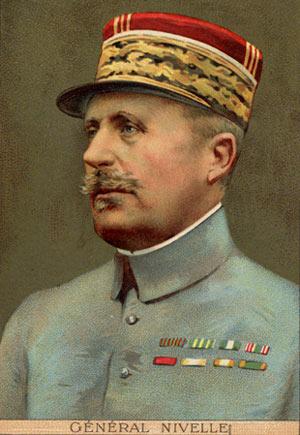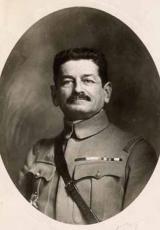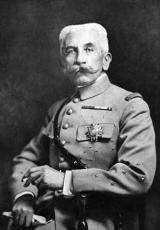Robert, Georges Nivelle

Born on the 15th October 1856 in Tulle into a protestant Franco-British family on his mother's side, Robert Nivelle proved to be a good student in addition to his bilingualism. Born on the 15th October 1856 in Tulle into a protestant Franco-British family on his mother's side, Robert Nivelle proved to be a good student in addition to his bilingualism. He enrolled at the Ecole Polytechnique (class of 1876) graduating in the artillery corps in 1878. Nivelle began his military career overseas. He joined the French expeditionary corps sent to China during the Boxers' Rebellion (summer of 1900), and then served in Africa, where he was particularly appreciated for his interpersonal skills. Promoted to Colonel at the beginning of the First World War, he once again stood out due to his exemplary conduct in the Alsace and, in September 1914, during the Battle of the Ourcq. In fact, by launching his infantry against the lines of the 4th corps of von Kluck's 1st army around Meaux, he saved the capital from the German threat. He was then promoted to Brigade General in October 1914, at the same time as Philippe Pétain. Becoming Division General the following year, Robert Nivelle took command of the 11th French army in May 1916, although he had been serving on the front at Verdun at the head of the 3rd corps of this army since February.
Having succeeded Pétain on the 19th April 1916, he carried out victorious missions at Vaux and hill 304 and on the 24th October 1916, the retaking of the fort de Douaumont, alongside his subordinate, General Mangin. These particular victories earned him growing popularity amongst the troops, despite the lack of respect he showed for human life, relentlessly sending his men on the attack. As a result of these victories, Robert Nivelle appeared to be the natural successor to Joffre, who had been judged to be too static after two years of fighting in the trenches, and promoted to the dignity of Marshall of France. General Nivelle also had the advantage of very close contacts in British headquarters because of his family background. He took up the role of Commander in Chief of the army on the 12th December 1916, promising the Chamber's Army Commission a quick victory. Guided by his faith in the rift, he decided to break with the positional war to return to a dynamic offensive by attacking the fortified German lines in the Chemin des Dames sector, with support from the British troops placed under his command by Lloyd George. Braving the reticence of his Generals, who argued the lack of preparation of the soldiers, and also of several military leaders, such as Lyautey, the short-lived War Minister and especially Pétain and the political authorities, anxious at the possibility of a setback, he launched the Chemin des Dames offensive on the 16th April 1917. This assault, which he hoped would be lightning quick, came to a sudden end: the Germans, having got hold of a copy of his plan of attack in a trench that they had captured, had strengthened their positions and put up fierce resistance; the operation was a failure that was expensive, both in terms of men (350,000 men out of action for an insignificant gain of ground) and in equipment. George Nivelle persisted, suspending the attack on the 21st April, before taking it up again at the beginning of May. The troops were demoralised, losing confidence in their leaders: the first mutinies broke out. Nivelle was thanked and replaced on the 15th May 1917 by Philippe Pétain. An enquiry committee was then set up. Directed by Division General Henri Joseph Brugère, it gave the ruling on General Nivelle: "For the preparation as well as the execution of this offensive, General Nivelle was not up to the enormous task that he had taken on". Fallen into disgrace, he went to North Africa in December 1917 to take charge of the 19th army corps in Algiers as commander of the French North African troops, a role he would carry out until his retirement in 1921; he then returned to mainland France and settled in Paris where he died three years later.




